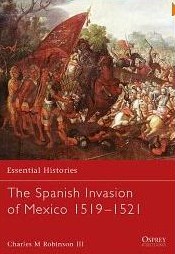Charles M. Robinson III
The spanish Invasion of Mexico 1519-1521

If only the Spaniards had been Anglosaxons, and Mexico spoke English today, we would have some great epic films to behold now. But poor race that we are, we haven't dared to make the first film; neither can the Mexicans, for that matter. (We, the West, have given up the Cross again, and are more prone to immolate ourselves on some sacrificial altar than try to find anything worth fighting for).
Now to the book. This is a great overview, succint and accessible to everybody. A pleasure to read, being so difficult to condense what other books took so many pages, sparsed with some very helpful and necessary maps and illustrations.
This book is titled 'Invasion', but I don't quite agree with its title, since this part of the conquest, the invasion, was fundamentally the key part of the whole process of conquest and subjugation of this area of America. It may be a condescension to PC readers but it is nothing but symbolical, since the story is what it was, and you can't change that. However, once that is said, there are no more hints of this type inside. The author simply summarizes the facts in a most reader-friendly way. He shows us the background of both peoples involved in this clash of civilizations, their beliefs, dreams and fears; in one word: what kind of people they were, without being judgemental.
Hernán Cortés was an extraordinary man.
One interesting excerpt:
"Tlaxcala (one of the Mexican nations who fought alongside Cortés, against the Aztecs) remained faithful to the end, and throughout the colonial period (when Spaniards really messed it up, and Cortés being absent, the burocrats and carpetbaggers moved in) was described in Spanish sources as 'most loyal'. This has earned the modern city and state the disdain of other parts of Mexico, particularly Mexico City, where citizens contend that the country was betrayed by Tlaxcala. Modern Tlaxcalans, however, are equally touchy about their reasons for siding with Cortés, and are quick to point out all the grievances their country had with Aztec Mexico."
And this important piece of information: "To the very end, they (the Aztecs) were self-conscious of the fact that they were foreigners ... they believed that just as they had conquered and subjugated the natives, so others might conquer and subjugate them." Which certainly happened.
And: "Whatever the atrocities for which the Castilians may be blamed in the five centuries cince the Conquest, their acts paled in comparison to those of their Tlaxcalan allies. Centuries of hate and the basic viciousness of Mesoamerican warfare combined in a violence that appaled even Cortés himself."
Cortés writes to the king of Spain: "I had posted Spaniards in every street, so that when the people began to come (to surrender) they might prevent our allies from killing those wretched people, whose numbers were uncountable. I also told the captains of our allies that on no account should any of those people be slain; but there were som many that we could not prevent more than fifteen thousand being killed and sacrificed (by the Tlaxcalans) that day."
Cuauhtémoc -the last Aztec emperor- was not a hero. He was the last tyrant of an imperialist and foreign nation. Of all the nations that dwelt in Mesoamerica in those years, the Aztecs (and they were always self-conscious of it) were as foreign as the Spaniards could be.
I recommend also the book "The Conquest of Darkness" by Warren Carroll. Very succint account of the same story but focusing more on the cultural and religious backgrounds of both Spaniards and Aztecs. Both these books complement each other perfectly.
